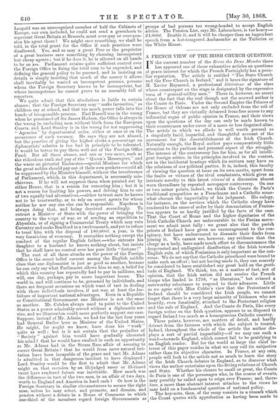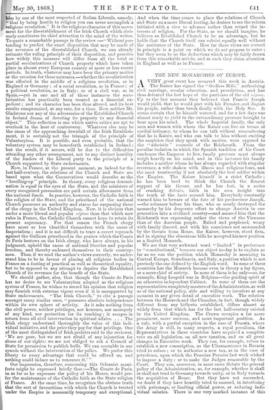A FRENCH VIEW OF THE IRISH CHURCH QUESTION.
the current number of the Revue des Deux Mondes there I has appeared one of those exhaustive articles on questions of grave interest for which the French Fortnightly has a pecu- liar reputation. The article is entitled " The State Church and the Free Church in Ireland," and it bears the signature of M. Xavier Raymond, a professional litte'rateur of the class whose counterpart on the stage is designated by the expressive term of "general-utility men." There is, however, no secret about the fact that the real though not the avowed author is the Comte de Paris. Under the Second Empire the Princes of the House of Orleans are not only excluded from the soil of France, but they are virtually debarred from free access to any influential organ of public opinion in France, and their views upon the questions of the day can only be made known to their countrymen under cover of a more or less disguised alias. The article to which we allude is well worth perusal as a singularly lucid, impartial, and thoughtful account of the movement for the disestablishment of the Irish Church. Naturally enough, the Royal author pays comparatively little attention to the partizan and personal aspect of the struggle. The interest of the controversy lies for him, as for all intelli- gent foreign critics, in the principles involved in the contest, not in the incidental bearings which its outturn may have on the relations of our political parties. It is, indeed, this faculty of viewing the question at issue on its own merits, apart from the faults or virtues of the rival combatants, which gives an intrinsic novelty to this latest re'sume' of a discussion almost worn threadbare by repeated newspaper controversy. On one or two minor points, indeed, we think the Comte de Paris's traditional sympathies as a Frenchman and a Catholic some- what obscure the impartiality of his judgment. His eulogy, for instance, on the services which the Catholic clergy have rendered to the cause of order by their denunciation of Fenian- ism appears to us hardly justified by the facts of the case. That the Court of Rome and the higher dignitaries of the Irish Catholic Church are unfavourable to the Fenian move- ment we admit most fully : we grant also that the parish priests of Ireland have given no encouragement to the con- spiracy, but have endeavoured to dissuade their flocks from joining it. We cannot see, however, any evidence that the clergy as a body, have made much effort to discountenance the deep-rooted and undisguised disaffection of the Irish towards English rule, of which Fenianism is only important as the out- come. We do not say that the Catholic priesthood were bound to make such an effort ; but not having made it, they can scarcely be considered to have established any great hold on the grati- tude of England. We think, too, as a matter of fact, not of opinion, that the Irish nation did not receive the French troops who landed in 1798, "as liberators," but evinced a noteworthy reluctance to respond to their advances. Little as we agree with Miss Cobbe's view that the Protestants of Ireland should be considered the Irish people, we cannot forget that there is a very large minority of Irishmen who are heartily, even fanatically, attached to the Protestant religion and the rule of England. And the Comte de Paris, like every foreign writer on the Irish question, appears to us disposed to regard Ireland too much as a homogeneous Catholic country.
These points, however, are matters of detail, and hardly detract from the fairness with which the subject is treated. Indeed, throughout the whole of the article the author dis- plays a sort of partial impartiality—if we may use such a word—towards England, which cannot fail to be gratifying to an English reader. But for the world at large the chief in- terest of this paper resides in what we may call its subjective rather than its objective character. In France, at any rate, people will look to the article not so much to learn the story of the Irish Church debates in England, as to discover what views the author entertains upon the fitting relations of Church and State. Whether his chance be small or great, the Comte de Paris is one of the personages who, in the course of events, may possibly be called upon to reign over France; and, there- fore, a more than abstract interest attaches to the views he may hold on a fundamental question of national policy. The key-note, then, of the essay consists in a remark which the Count quotes with approbation as having been made to by one of the most respected of Italian Liberals, namely, that by being hostile to religion you can never accomplish a gious revolution." It is the religious character of this move- ment for the disestablishment of the Irish Church which obvi- ously constitutes its chief attraction to the mind of the writer. To quote a remarkable passage in the review :—" Without pre- tending to predict the exact disposition that may be made of the revenues of the disestablished Church, we can already estimate the ruling principle of their disposition, and perceive how widely this measure will differ from all the total or partial secularizations of Church property which have taken place in almost every European country at more or less recent periods. In truth, whatever may have been the primary motive or the occasion for these measures,—whether the secularization was effected in the middle of a religious revolution, as in England or Germany ; of a social revolution, as in France ; of a political revolution, as in Italy; or of a civil war, as in Spain,—yet in one and all of these instances the secu- larization has practically been treated as a financial ex- pedient; and its character has been thus altered, and its best results compromised, at any rate, for a time. Now, neither Mr. Gladstone nor any of the adversaries of the Established Church in Ireland dream of devoting its property to any financial object." This reflection is one which native critics are apt to overlook in the heat of controversy. Whatever else may be the cause of the approaching downfall of the Irish Establish- ment, it is certainly not the triumph of the principle of Voluntaryism. It is possible, and even probable, that the voluntary system may be henceforth established in Ireland ; but the result, if it occurs, will be due to the difficulties attending any other arrangement, not to any distinct hostility of the leaders of the Liberal party to the principle of a Church supported by State endowments.
Now, in France, at the present moment, as indeed for the last half-century, the relations of the Church and State are based upon what the Conservatives would describe as the "levelling-up" principle. In theory, every religious denomi- nation is equal in the eyes of the State, and the ministers of every recognized persuasion are paid certain allowances from the national funds. In practice, however, the Catholic faith is the religion of the State, and the priesthood of the national Church possesses an authority and status far surpassing those of the clergy in the United Kingdom. Now, it is obvious that under a more liberal and popular re'ginze than that which now rules in France, the Catholic Church cannot hope to retain its present supremacy. For that reason the French clergy have more or less identified themselves with the cause of Imperialism ; and it is not difficult to trace a covert reproach against the Galliean priesthood in the praises which the Comte de Paris bestows on the Irish clergy, who have always, in his judgment, upheld the cause of national liberties and popular freedom, and thereby endeared themselves to their country- men. Thus, if we read the author's views correctly, we under- stand him to be in favour of placing all religious bodies in France on a footing of practical as well as theoretical equality, but to be opposed to any attempt to deprive the Established Church of its revenues for the benefit of the State.
We should gather, also, that though the Comte de Paris has no desire to see Voluntaryism adopted as the religious system of France, he wishes to record his opinion that religion may flourish with extreme vigour even if it is unsupported by State endowments. "The Irish Church," to cite a passage amongst many similar ones, "possesses absolute independence within its own sphere of activity. As it asks nothing from the civil power, neither privileges, nor honours, nor monopoly of any kind, nor protection for its teaching ; it escapes in return from all civil intervention in spiritual affairs. . . . The Irish clergy understand thoroughly the value of this indi- vidual initiative, and the price they pay for that privilege. One of the most distinguished of Irish prelates said to the reviewer, We are poor, but we are not afraid of any injunction for abuse of our rights: we are not obliged to ask a Council of State for permission to publish bulls. We can assemble in our synods without the intervention of the police. We prefer this liberty to every advantage that could be offered us, and nothing could induce us to renounce it.' " Our impression, therefore, concerning this Orleanist mani- festo might be expressed briefly thus :—The Comte de Paris, in as far as he expresses the policy of his House, would pre- fer the maintenance of the Catholic faith as the State religion of France. At the same time, he recognizes the obvious truth that the sort of favouritism with which the Church is treated under the Empire is necessarily temporary and exceptional. And when the time comes to place the relations of Church and State on a more liberal footing, he desires to see the reform initiated with a view to advance rather than retard the in- terests of religion. For the State, as we should imagine, he believes an Established Church to be an advantage, but he holds that the Church itself can subsist equally well without the assistance of the State. How far these views are correct in principle is a point on which we do not propose to enter ; but they seem to us the deductions which may be fairly drawn from this remarkable article, and as such they claim attention in England as well as in France.































 Previous page
Previous page